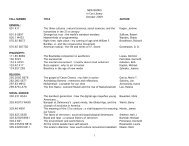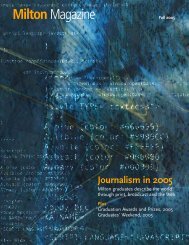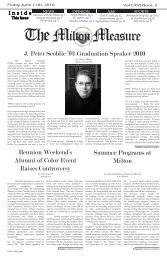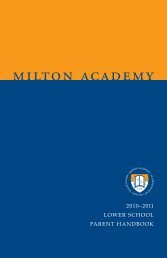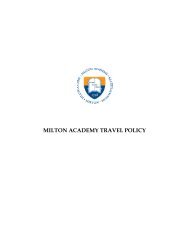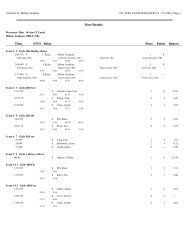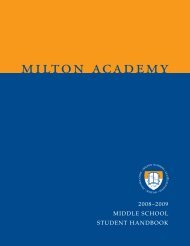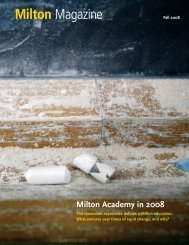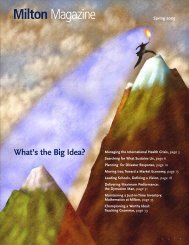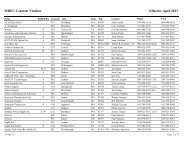Faculty PerspectiveSelf EducationEducation either functions as an instrument which is used tofacilitate integration of the younger generation into the logic ofthe present system and bring about conformity or it becomes thepractice of freedom, the means by which men and women dealcritically and creatively with reality and discover how to participatein the transformation of the world.—Paulo FreireI have always believed that education is a process of questioningand that a teacher’s job is to challenge her students,widening their vision to a broader perspective, as well asdeepening their awareness. Education is about acknowledgingour preconceptions and allowing them to be brokendown in order to reconstruct a worldview out of greaterunderstanding. When I moved to Dallas five and a halfyears ago, I took this fundamental intuition about educationwith me. I knew Dallas was more conservative than theCambridge I had grown accustomed to, but I also knew thatI was prepared for a wholesome fight, the kind of intellectualwrangling that is native to the world of academia.For the five years of my tenure in Dallas, I was defined overand against the culture of the school and its administration.I was branded the “radical feminist liberal” who questionedthe Bible, who criticized the patriarchal representation ofGod, and who identified herself as culturally Christian andspiritually Buddhist. Needless to say, all of this was unacceptable,and I quickly learned that my view of educationwas quite different from the school’s objectives. There is alot to learn from being the “troublemaker” in a place. It wasan opportunity for me to reflect seriously on my own valuesand principles, as well as articulate them to an audiencethat often embraced an opposing view. I also learned toappreciate the conflict that exists in a place where peoplehave different opinions or ways of seeing the world. WhatI didn’t recognize at the time, however, was the negativeimpact of the school’s pressure against my perspective.On October 11, 2006, <strong>Milton</strong> <strong>Academy</strong> hosted its fourthreligious speaker since the 1952 Endowment for ReligiousUnderstanding had been established. I was pleased to hearthat it would be Bishop John Shelby Spong, the retiredbishop from the Episcopal Diocese in New Jersey. I had metJack Spong during my academic studies at Harvard DivinitySchool and remembered him as decidedly controversial, yethe was also overtly faithful. He proposes a very modernunderstanding of the biblical tradition to correspond to ourpostmodern society and sensibility. Bishop Spong rejectsreligious fundamentalism as divisive and contrary to thecore message of scripture, to love one another. The bishop’smessage is one of social justice, of standing with those atthe margins of society and struggling with them to guaranteethat their voices are heard. While Bishop Spong illustratedthe dark side of religion, expressed through violenceand hurtful speech, he simultaneously asserted the optimisticideal of religion: “Live fully, love wastefully, and beall that you can be.”Bishop Spong’s visit was an early turning point for me at<strong>Milton</strong>. First, his speech was a vocalization of my own intellectualand spiritual understanding, which had been inhibernation for some significant time. Second, just listeningto the Bishop’s expression of his own theology reignitedmy passion for theological thinking and reflection. JackSpong’s presence on the <strong>Milton</strong> campus provided me witha certain sense of freedom—free to speak my own mindwhen necessary, free to bring a critical theological perspec-38 <strong>Milton</strong> Magazine
Suzanne DeBuhrtive to the <strong>Milton</strong> community, and free to fully embrace theaspects of my character, which in Dallas had been used todismiss my observations of that community.Bishop Spong’s presentation also catapulted me into thedynamic, open exchange of ideas that is inherent to the<strong>Milton</strong> community. Controversy tends to follow Jack Spong,and <strong>Milton</strong> was no exception. In the conversations that followedBishop Spong’s talk, I was able to assess the currentperception of religion within the <strong>Milton</strong> community. Manystudents were intrigued by the bishop’s talk, agreeing withhis insights that the Bible must continue to be reinterpretedto have legitimacy in our modern world. In a sense,Bishop Spong’s speech was an invitation for some to rejointhe debate over Christianity in American society from botha modern and critical perspective. On the other hand, asignificant group of students felt offended by the bishop’sanalysis of fundamentalist Christianity. They questionedhis faith and wondered if characterizing the Bible, as wellas some of Christianity’s doctrinal statements, as merelysymbolic, compromised his position as a representative ofmainline Christianity.Whether one agreed with the bishop or not, what becamevery clear is that he got everyone talking and thinking andreflecting on our own individual faith perspectives. Whatalso became clear to me, in my official position as chaplain,was the need for a theological foundation in the conversationsthat followed the bishop’s visit. Jack Spong’s theologyand his understanding of the Bible, although new conceptsto our students, were inspired by post-Enlightenmentscholars, such as Rudolf Bultmann, who developed theconcept of demythologizing biblical stories, and FriedrichSchleiermacher, who constructed a Christology in whichJesus’ divinity corresponded to the fulfillment of humanpotential. Overall, Jack Spong demonstrated for this communitythe meaning of engaged education—of venturinginto uncharted waters, broadening our vision, and allowingdiscoveries to unfold with each new piece of knowledge.Being at <strong>Milton</strong> for the past few months has revitalized myfaith in the educational process. I admire this community’scourage and willingness to invite and listen to diverse voices,among them Jack Spong’s, not because they promotethe correct agenda or the right way of thinking, but becausethey challenge us to discover our own truths and becomeactive participants in our own education. I am grateful to bein a place where I am welcomed into the fold and encouragedto express my most genuine self. I believe that trueeducation takes place only by engaging critically and creativelywith the questions that affect our deepest sense ofself and perception of reality. Education is about the transformationof the world—one individual at a time.Suzanne Y. DeBuhr, Interfaith Chaplain39 <strong>Milton</strong> Magazine



